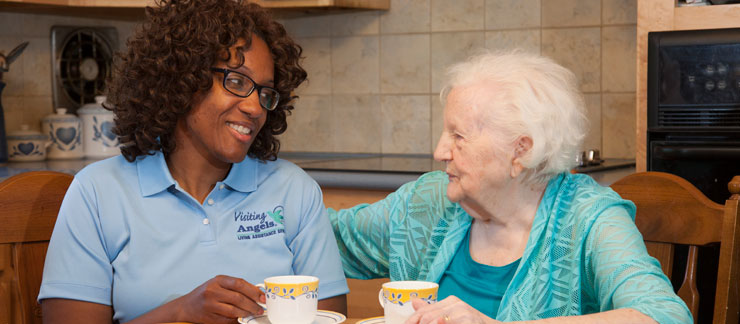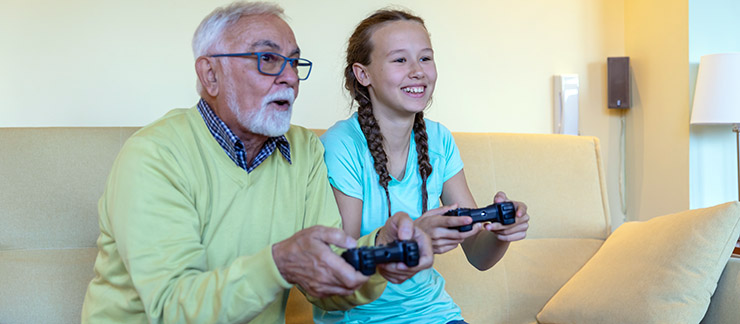How to Communicate with Your Loved One Who Has Parkinson's
If you are caring for a loved one with Parkinson’s disease, you are probably familiar with two of the hallmark physical symptoms: tremors and impaired gait.
Unfortunately, the disease also affects a person's ability to communicate, which can be frustrating for both caregivers and your loved one with Parkinson’s.
As with many aspects of caregiving, the more you know, the better you can handle challenges. Improving communication with people who have Parkinson's is possible.
The Physical Effects
Experts in the field of Parkinson’s advise that it is very individualistic, so physical symptoms can vary widely from person to person. In general, Parkinson’s disease often affects speech. People with Parkinson’s may have softer voices that sound hoarse or blurred. Some people with the disease begin to speak rapidly and may stutter.
Another manifestation of the disease is lack of facial expression. This can make it appear as though a person with Parkinson’s isn’t listening or engaged. The nuanced “body language” part of communication can be limited by decreased facial expression and the inability to make hand gestures due to tremors or decreased muscle control.
People with Parkinson’s may often lose their train of thought. Hallucinations can sometimes be symptoms of the disease or a side effect of medication can also impede comprehension and make conversation very difficult.
Strategies for Caregivers
While your approach to communication will need to change as the disease progresses, there are ways to help you maintain a relationship with your loved one:
- Focus
When talking with a person who has Parkinson's, try to maintain eye contact. Sit down if necessary to be at eye level. Parkinson’s can make it difficult for someone with the disease to talk while doing something else (like walking), so conversations may require a concentrated effort from both parties. Group communication may be overwhelming for someone who requires a bit more time to form a response. One-on-one conversations are more manageable.
- Keep it simple
Ask “yes” or “no” questions and avoid complicated sentences. If you are talking about other people, use names instead of pronouns to help clarify the conversation. Make it clear when you change subjects.
- Time it
Medications used to treat the disease can cause “on” and “off” times for patients. Take advantage of your loved one’s “on” times to talk and let him or her know how much he or she is valued.
- Be patient
Avoid finishing the other person's sentences. Finding the words can be difficult for a person with Parkinson's, but interjecting can add to his or her frustration.
- Use new tools
Parkinson’s can take a toll on handwriting as well, so written communication may be difficult. Amplification systems are available that use a small, wearable microphone to make a person’s voice louder (this can be especially helpful if you as a caregiver have hearing loss). Some systems include a receiver that the caregiver can wear, making it easier to communicate from separate rooms. Video calling services, like FaceTime or Skype, can help caregivers who aren’t close by monitor their loved one’s overall condition.
Don’t Go In It Alone
Communication challenges can make both caregivers and their loved ones with Parkinson’s feel very isolated. Reach out to professionals to help you manage the responsibilities of care.
- Professional Caregivers
As a family caregiver, you need to take breaks. Consider a professional caregiver who can visit your loved one in his or her own home, providing safety and social stimulation for your loved one and the opportunity for you to step away and pursue your own interests. This is never easy, but you must remember that your frame of mind is important in communication. Although a person with Parkinson’s may seem disengaged, he or she can still sense your feelings by your tone of voice. Respite can allow you to refocus and avoid dangerous caregiver burnout.
- Speech-language pathologists
Professional speech or language therapy can help people with Parkinson’s strengthen their voices and improve the pace of speaking. Experts recommend meeting with a speech therapist as soon as possible after a Parkinson’s diagnosis to set baseline measurements and evaluate speech and swallowing ability.
- Occupational therapists
Therapy in this field can help people with Parkinson’s who would like to use a computer or electronic device to communicate. An occupational therapist may also have recommendations for improving handwriting.
Your Voice Counts
As you work to hear your loved one with Parkinson’s, make sure your voice is heard, too.
Caregiving is stressful. Be sure to discuss your needs, feelings and fears with family, a trusted friend or a mental health counselor. Ask questions about the disease and take advantage of information provided by medical professionals.
A local support group for caregivers can provide additional tried-and-true methods of communicating with people with Parkinson’s. Online, try tapping into information from the Michael J. Fox Foundation, the National Parkinson Foundation or the Parkinson’s Disease Foundation.













